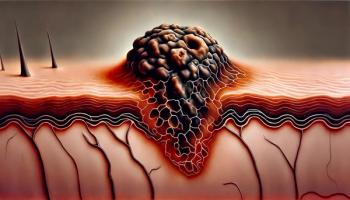
- ONCOLOGY Vol 14 No 11
- Volume 14
- Issue 11
Three-Arm Phase II Study of Temozolomide in Metastatic Melanoma: Preliminary Results
Temozolomide, an oral alkylating agent, has shown activity against metastatic melanoma. The drug is schedule dependent and is given daily for 5 days. Altering the schedule may enhance its activity by depletion of the protein O6-alkylguanine-DNA
Temozolomide, an oral alkylating agent, has shown activity against metastatic melanoma. The drug is schedule dependent and is given daily for 5 days. Altering the schedule may enhance its activity by depletion of the protein O6-alkylguanine-DNA alkyltransferase, a major determinant of resistance to temozolomide. Additionally, we propose to combine temozolomide with interferon alfa or thalidomide (Thalomid), a new antiangiogenic agent.
We report the preliminary results of an ongoing three-arm phase II study aiming to assess the efficacy of temozolomide in an 8-hour schedule against the 24-hour schedule in combination with either interferon alfa or thalidomide in metastatic melanoma. Patients with untreated metastatic melanoma were randomized to either arm A (oral temozolomide at 200 mg/m² every 8 hours for five doses); arm B (oral temozolomide at 200 mg/m² days 15 and interferon alfa at 5 million IU/mL² subcutaneously three times a week for 4 weeks); or arm C (oral temozolomide at 150 mg/m² days 15 and oral thalidomide at 100 mg daily for 28 days). Cycles were repeated every 28 days for up to 1 year. 50 patients have been randomized to date (18 to arm A, 17 to arm B, and 15 to arm C). The median age was 55 years (range: 1778 years) and the median World Health Organization performance status was 1 (range: 02). Six patients had central nervous system metastases and 37 visceral metastases.
A total of 43 patients were evaluable for response and 47 for toxicity. The most common side effect was myelosuppression. Grade 3/4 thrombocytopenia occurred in 17 patients (36.1%), with one treatment-related death due to intracerebral hemorrhage in a patient with brain metastases. 15 patients presented with grade 3/4 leukopenia (31.9%), more frequent in arms A and B (P = .017), with associated fever on three occasions. Grade 1/2 diarrhea was more common in arm B (P = .032). Nonhematologic toxicity was mild to moderate with similar frequency on the three arms. There were 8 patients with partial responses (16%), 10 with stable disease (20%), and 24 with progressive disease (48%). The median overall survival time was 6.5 months and the median response duration was 5.9 months.
CONCLUSION: These results suggest that temozolomide alone or in combination has activity against metastatic melanoma. Treatment in all arms appears generally well tolerated with myelosuppression as the main side effect. Further recruitment is required to identify differences in efficacy and toxicity.
Articles in this issue
over 25 years ago
Clinical Oncology, Second Editionover 25 years ago
Early Diet May Play Important Role in Breast Cancer RiskNewsletter
Stay up to date on recent advances in the multidisciplinary approach to cancer.















































